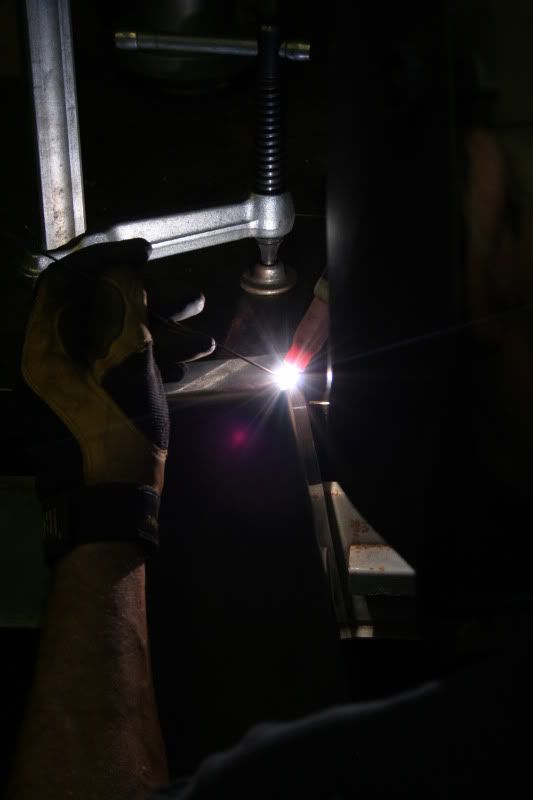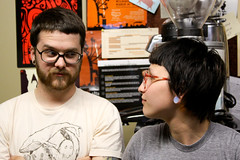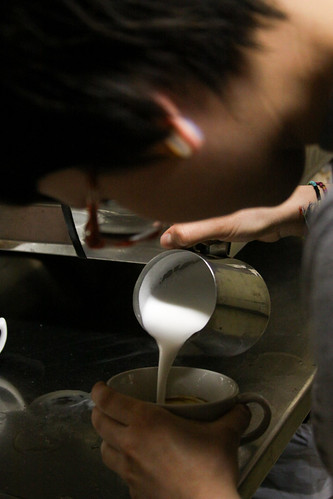Saturday, June 27, 2009
Where should my focus be?
Back in Michigan, when I worked at Kozy Koffee, I was struck with an idea. Where should my focus be? The coffee? The industry? The method? The job? Well, I concluded that since I was fortunate enough to work in the industry as a barista that I should redefine my title. I, in fact, do not and did not want to be a barista, I wanted to be a scientist and a researcher. So, I looked and found that there was many views and styles of producing the consumable coffee.
At the time I had been pretty lost and apathetic towards my job and my life. I really had not any reason at that point to be investing any time into coffee beyond the fact that I was paying bills and that sure felt good. I still to this day do not feel any connection to the rock-star barista lifestyle. It is not my goal to become famous and I pretty much despise idol worship. I have other ideas and plans, and as far as the industry is concerned, well as you could tell by my last blog post, I really am not happy with the current industry and its focus on certifications and processes. Although, I am happy with a few dudes doing some great things for the coffee itself.
The coffee, well, I love the coffee. I think it is beautiful and fantastic and it touches so many people around the world. This is indeed where a lot of my focus has been lately, but I sincerely find that beyond that, I have become very upset with what is done to the coffee by both uneducated persons and persons ignorant to the proper and professional ways of making coffee.
Which leads me to what I was thinking about back in Michigan. I was working with one other person (Courtney) who actually cared about the coffee as much as me. And well, I took it in my own hands to better my knowledge and do the right thing with the coffee. I personally bought a Chemex and designed my very own pour over/ drip station. I really wanted to find the right way of making coffee that would compliment the specific coffee brewed. I was very sick of airpot coffees that would sit for hours at a time. Coffees that would be dosed incorrectly, coffees that would not be ground to the correct setting, and mostly over extracted coffee. I was sick of coffees that were tainted with flavors added to them. To this day, I get angry thinking about how there are forces out there in the world that define coffee as just an economic commodity that needs sugar, milk, syrups and sauces.
I can understand working a job to make money to pay the bills, but lack of care and ignorance leads to bad quality, there is no doubt about it. I honestly refuse to go into most coffee shops because I know I can not get a good cup of coffee. I never, and I mean never, order a cup of coffee from a restaurant because there is no focus on the coffee, it is a restaurant. I also never get gas station coffee, I will leave that right there.
So the focus, where should the focus be in my rant? The focus is on the quality. The focus is on the coffee bean. The focus is on the method. Every coffee blog and site you go to will have fifty million different ways of telling you how to prepare the coffee, and how to properly do everything coffee related. The truth is, everyone is really just learning. Although the story of coffee is as old as humanity, maybe even older, we are just now in the past 100 years roasting the beans to a standard level, and only for the past ten to fifteen years been roasting the coffee to get real flavors, and I am not talking about dark roasted anything.
I feel like we are on the cusp right now of righting wrongs that have been wrong for so long. All the misconceptions are in the process of being de-misconceived, (if that is even a word.) The point is this, the more we learn about coffee the more we need to hold the standard higher. An analogy is in order : Yes, you can paint at home, but most likely, you will never be a Monet or a Da Vinci. Its the same with coffee, you can most likely make a good cup of coffee at home, but if you get it professionally made, it can be life changing.
I really hope that this does not come off as overly pretentious. It is just that when consumers go into coffee shops with uneducated baristas, it really projects onto the consumer. The consumer then becomes also mis-educated and passes the ignorance along. The current coffee markets have been in many ways very progressive by allowing the importation of some of the best coffee to ever have been tasted, and in so many cases this great coffee's potential is ruined by this ignorance. I am reminded of those medicine commercials you see on the television for all the new drugs being marketed, “Please consult a professional before use!” We have the ability to make great coffee, just a lack of knowledge currently that is stopping most.
Common problems that are constantly being corrected:
1.Do not freeze your coffee
2.Do not keep it in the fridge
3.You have thirty days limit after the roast day to use your coffee before spoilage occurs
4.Only grind your coffee right before you are about to use it
5.Dark roasted equates to “burned all the flavor away”
6.Dark roasted coffee also does not have more caffeine than light roasted coffee
Sunday, June 21, 2009
Empathy, dignity, and economy...
I see something unnerving in this picture and it starts in that I love coffee. Not just the morning cup, and not the exploits of becoming a "rock-star" barista. I love coffee in that I feel as if I am a part of something that is as old as history. It is in the story of the bean, that the trouble starts. The story that stands behind every coffee bean that is picked and the person that had to pick that bean in order to stay alive.
I must confess that I have only been "in" the coffee industry for about five years now and am by no means an expert, but I am a human and have what I feel to be an immense amount of empathy for other humans. What I have come to learn in my five years, is that in the "industry" of coffee, the people who pick all the coffees from around the world, work for next to nothing in comparison to what their labor produces for others in the chain of coffee consumption. What I mean is this; the average coffee farmer get pennies per pound of coffee sold, and through the normal channels of international trade the coffee comes out on my end in a cafe/roaster setting costing the consumer nearly eleven dollars per pound. The gap is huge. Where does the money go and why are the coffee farmers still living in poverty?
I am by no means going to pretend to be stupid and ignore the fact that there are costs involved in shipping hundreds of thousands of pounds of coffees from all corners of the earth to thousands of other places around the globe, on the contrary, I am very aware. But I am also aware of quality and the debate on Fair Trade vs. not Fair Trade. The debate stems from the fact that the certification by the Fair Trade organization in turn pays the coffee farmers more per pound of coffee than the average non-Fair Trade coffee. This in turn also helps the farmer out by giving them more money to re-invest back into the farms, labor and increase the quality of their lives. The counter point is that the term Fair Trade in no way indicates quality. From the viewpoint that I currently stand, I only want the best coffees that I can buy. Unfortunately, the Fair Trade markets have driven, in some respects, the quality of coffee down by instead of promoting quality coffee, promoting certification by the Fair Trade organization, so that the farmers could get more money by producing an inferior bean.
Writing this, I feel a certain level of guilt. I do feel like coffee farmers need to be paid more, but only a premium to those who dedicate themselves to quality. The comparison that I often reference is that of natural selection. The website Wikipedia.org defines natural selection as "the process where heritable traits that make it more likely for an organism to survive and successfully reproduce become more common over successive generations of a population." In terms of the economy of coffee, when consumers support this "Fair Trade" over quality, they are inhibiting the natural flow of increasing the quality of their crop and therefor inhibiting the farmer from getting paid more for producing quality coffee.
What happens, as I have read, is that instead of all these farmers producing better quality coffees, they work the farm from a mostly "get the job done" perspective, not caring and therefore driving the quality and market for the coffee down. The market is driven down when average quality coffee is taken to the local cooperatives, where they are often mixed together with all the other coffees from the regions where they are harvested. This is really a big thing considering that this will mix all the hard work of the farmers who care with the coffees of the farmers who do not really care. On my end, what this does is gives us, the roasters and the consumers? We end up with coffees that have no merit beyond the Fair Trade certification.
Again I would hate to come off as stupid and ignore the hard work of a few daring souls that are out there really working to increase quality of coffee and quality of life for the farmers. Intelligentsia has created and copyrighted the term "Direct-Trade," where they deal directly with the farmer, but even more recently as written on his personal blog of at dougzell.com, Doug Zell, who basically is Intelligentsia has begun importing coffee and by doing so "are... guaranteeing our growers great prices for great coffees through our pioneering Direct Trade program, but importing and financing our coffee ourselves provides an even greater degree of transparency and logistical control that allows us to land carefully selected Direct Trade coffees months sooner than if we were using outside importers." There is also Stumptown coffee who "pays the highest prices ever seen in these countries in pursuit of these (coffees)." The coffees they purchase are among the best you can buy and are according to their website "the product of a maximum commitment of time, energy and money from our farmers."
My personal problem lies in the question "What can I do to help?" On the small scale roasters side of things, is it possible to really help when the the roaster to go through an importer? Is it possible to help these farmers when it is at this point almost impossible for the average coffee shop to survive? Is it possible to help when misinformation and greed permeates the roots of the coffee industry?
So, last night I watched a movie... It moved me, it changed the way I am thinking about the coffee industry, it has inspired me. It has been a goal of mine for the last year or two to source my own coffee, giving dignity, context, and a face to the coffee farmer, buying directly from him. My hopes are that the industry will change for the better by then. It shouldnt have to be so hard to show you care...
Saturday, June 13, 2009
My homies from Michigan

From the top left: My good friend Josh Bongwater, Miro "Always" Lomeli, Me, Courtney Vaquera, Second row:Jim Saborio owner of Comet Coffee AA, MI), and Ypsilanti famous Ethan Billups
The Jam at Alterra
So, I know its kinda late but I decided that since "Luke" just uploaded these pics of the jam last Friday at Alterra on Humbolt, I can post them now. Its basically just me and the girl, and if you wanna see the others go to his flickr page and he has a ton up or check the Anodyne blog because I am going to post some up there too.

me and bee...

the girl pouring her heart out

me and an octopus's garden
Tuesday, June 9, 2009
Coffee Cupping
When I first started in the coffee industry I didn't drink coffee. Well, I drank coffee, but had thought that all coffee tasted so bad that it was pretty much undrinkable. So, like most all other coffee drinkers I added syrups, sugar, and milk to it anytime I wanted a cup. I had worked in the Highland, MI location of the chain coffee house "Its A Grind" where I was a manager, and ironically did not really know a thing about coffee. I must confess if it was not for Josh Longsdorf, (then of the Ugly Mug in Ypsilanti, MI and now of Ritual Coffee Roasters in California) I would probably not be working in coffee. I most likely still would not know a thing about coffee and frankly, I would not be living in Milwaukee. It was Josh who walked into our small coffee shop and found a few people who were like sponges waiting for the knowledge of coffee to be dripped on them. He first helped us learn the quality of espresso over corporate standards and practices, that coffee was one of the most important functioning parts of the world economy, and that above all it was delicious, beautiful and dynamic beyond most peoples’ comprehension. It was also Josh who took me to my first cupping and helped me understand the importance of cupping. It was this first cupping that I went to that helped me realize that coffee was by itself, as a single origin, amazing. It didn't need additives, it didn’t need milk, it didn’t need to be dark roasted, it needed to be just coffee.
Which brings me to my focus: What is cupping and why is it important? Well, as you can find cupping defined on the search engine Wikipedia.org, it is loosely defined as "the practice of observing the tastes and aromas of brewed coffee." Or basically just tasting the coffee and seeing what flavors you can taste in the coffee. But as a precursor to actually cupping, a few things must be defined in order to properly understand the depth of this unique practice.
'Taste', a term that is often confused with the term 'flavor' is actually the ability of your tongue to detect flavor. Whereas flavor is the chemical reactions upon your senses, and what we are talking about are those chemical impressions left by roasted and ground coffee beans. In other words, you taste things with your tongue, and flavors are what you taste. There are some other basic terms that are most often referred to when cupping that will be helpful to know:
- Fragrance- in our case the odor or scent that is found when coffee is ground.
- Aroma- the odors that are found and defined when breaking the crust of the coffee while cupping.
- Mouth-feel/ body- the tactile sensations the coffee gives to the mouth.
- Brightness- referring to the level of acidity in the coffee.
- Finish- How the coffee stays and reacts on your pallet over time after it leaves the pallet
So cupping as a practice goes basically as follows:
- You have a pre-weighed amount of ground coffee that you find in cupping bowls. Holding the cupping bowls in your hands and spinning the coffee inside it gives off the fragrance of the ground coffee. Most of the time you will find cuppers comparing different coffees, and the flavors in the coffees. Sometimes though, you will find people cupping the same coffee origin but different roast profiles to find which profile best suits the flavors that could be pulled from the coffee.
- Once all of the bowls are set with the pre-determined weight of coffee, you add near boiling water directly to the coffees, filling the bowls and then let them brew for approximately four minutes. This is to allow the coffee to fully extract all the flavors in a very concentrated form with all the oils, fats and flavors. This method allows the coffee not to be tainted by a bleached filter or other method of processing. Although you can find resources stating different ways to cup this should be sufficient for a basic level of cupping.
- After approximately four minutes you ‘Break the Crust.’ This is where you hover very closely over the cup, almost to the point of your nose touching the crust of the coffee. At this point you use a spoon to push the grounds that are floating on top to the side and inhale both with your nose as well as your mouth in order to pick up any aromas that the coffee might be giving off . The crust acts as an aroma inhibitor, and agitating the grounds at this point releases the aromas from the brewed coffee underneath.
- You now remove the remaining grounds from top of the cup with a spoon. Most of the grounds should have fallen to the bottom of the cup from the agitation with the spoon while breaking the crust. This step is done more as a precautionary step so that while tasting the brewed coffee your are not getting a large amount of grounds in your mouth.
- At this point you can begin tasting the brewed coffee in the bowl. You do this by putting your spoon in the coffee letting it fill up your spoon as if you were about to eat soup. You slurp the coffee into your mouth, spritzing your pallet with the brewed coffee. Slurping allows the coffee to properly penetrate your taste buds and at the same time aerate, and stimulate your pallet. This allows you to pick up more flavors of the coffee as well as better experience the brightness and body of individual coffees. It’s common in a basic setting that you would take notes of the specifics of the coffee throughout the cupping and when finished collaborate with other cuppers on the specifics of what everyone experienced with the coffees cupped.
So why do we post cupping notes and what if you don't taste what we posted in our cupping notes? Well, cupping is very subjective and our cupping notes are meant more as a general guideline of what we tasted in the coffees. So don't be upset if you don't happen to pick up some high-notes of ginger-spice and blueberries that we tasted, instead look for flavors you could identify with. I have been working really hard to develop my pallet and flavor definitions over the past year in order to pick out more aspects of coffee profiles. Cupping is a very great tool to increase your flavor vocabulary, it gives you an opportunity to focus on specific coffees, compare them to others, and really just give yourself a better threshold for tasting coffees in a general setting.
As far as I am concerned, I fell in love with coffee at my first cupping. I don't remember what the coffee was, but I do remember tasting full on sweet blueberries and not the harsh, bitter, over-extracted coffee that you will find at almost every coffee shop and diner around the world. After that day, I began researching coffee and all its aspects. I wanted to find out what made it tick and why it held such insane flavors for my tongue to discover. A few times of week, I spend my mornings, afternoons and nights cupping, diving deeper into the flavors and roast profiles from coffees around the world .

